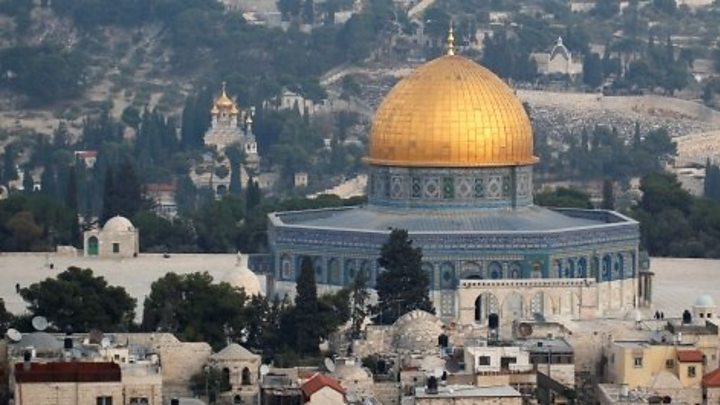
Jerusalem: Israel braced for protests over Trump declaration
Israeli forces in the occupied West Bank have clashed with Palestinians protesting against the US de..
Israeli forces in the occupied West Bank have clashed with Palestinians protesting against the US declaration of Jerusalem as Israel's capital.
Demonstrators in Bethlehem threw stones and troops fired tear gas. There are unconfirmed reports of injuries.
Tensions are high in the West Bank and Jerusalem amid calls for protests from Palestinian leaders.
Donald Trump's announcement was hailed by Israel but condemned across the Arab and Islamic world.
Western allies of the US have also disavowed the move, which reversed decades of US policy of neutrality towards Jerusalem's status.
Israel has always regarded Jerusalem as its capital, while the Palestinians claim East Jerusalem – occupied by Israel in the 1967 war – as the capital of a future Palestinian state.
In recognising Jerusalem as Israel's capital, the US became the first country to do so since the foundation of the state in 1948.
Where has there been violence?
Television pictures from Bethlehem show hundreds of chanting protesters facing off with Israeli troops along a main street.
Water cannon is being used to try to disperse the crowds, while clouds of tear gas and thick, black smoke from a burning tyres fill the air.
Extra battalions have been deployed to the West Bank, after clashes there, as well as in part of East Jerusalem and on the Gaza-Israel border on Thursday, left dozens of Palestinians wounded.
Media playback is unsupported on your device
Hundreds of additional police are also on duty in and around the Old City of Jerusalem. Demonstrations are being held outside the Old City walls after thousands of worshippers left the al-Aqsa Mosque compound where they held Friday prayers.
The Old City, containing contentious holy sites, is historically a flashpoint for violence.
The Fatah faction of Palestinian President Mahmoud Abbas called for Palestinians to take to the streets, while the Gaza-based militant Islamist group Hamas has called for a "day of rage" and a third intifada, or uprising, against Israel.

Media playback is unsupported on your device
Israeli forces struck "two military posts" in Gaza on Thursday, the army said, after three rockets were fired at Israel from inside the Palestinian enclave. There were no reports of injuries.
Elsewhere, demonstrations against Donald Trump's announcement have spread.
Thousands of pro-Palestinian protesters held noisy demonstrations in Jordan, Egypt, Turkey and Iran.
Further afield, protesters rallied in Malaysia, Bangladesh and Indonesia, the world's largest Muslim-majority country.
How has the international community reacted?
There has been widespread denunciation of Mr Trump's move, especially in the Muslim world.
America's closest Arab allies, Saudi Arabia, Egypt and Jordan, have expressed their opposition, while Egypt, Bolivia, France, Italy, Senegal, Sweden, the UK and Uruguay have called an emergency meeting of the UN Security Council on Friday to discuss the step.
The Palestinian president said Mr Trump's announcement was "deplorable" and a senior Palestinian official said US Vice President Mike Pence was "not welcome in Palestine" during a planned visit to the region later this month.
Israel's arch-foe Iran accused Donald Trump of trying to provoke a war, while the Iran-backed Hezbollah movement in Lebanon called on the Muslim and Arab world to support a new intifada.
Israel itself has hailed the announcement as historic. Prime Minister Benjamin Netanyahu called it a "courageous and just decision", while some 250 Israeli rabbis, including the chief rabbi of the Sephardi Jewish community, signed a letter thanking Mr Trump.
Why does Trump's announcement matter?
Jerusalem is of huge importance to both Israel and the Palestinians. It contains sites sacred to the three major monotheistic faiths – Judaism, Islam and Christianity.
Israel occupied the eastern sector – previously occupied by Jordan – in 1967, and annexed it in 1980, but the move has never been recognised internationally.
Some 330,000 Palestinians live in East Jerusalem, along with about 200,000 Israeli Jews in a dozen settlements there. The settlements are considered illegal under international law, though Israel does not regard them as settlements but legitimate neighbourhoods.
According to the 1993 Israel-Palestinian peace accords, the final status of Jerusalem is meant to be discussed in the latter stages of peace talks.
The last round of talks between Israel and the Palestinians broke down in 2014 and while the US is formulating fresh proposals, Palestinian officials have said Mr Trump's announcement has disqualified the US from brokering future negotiations.

